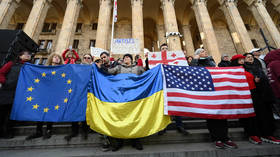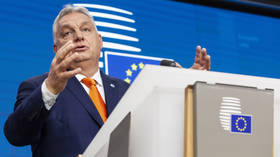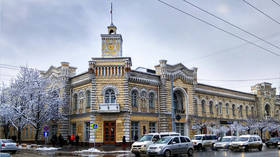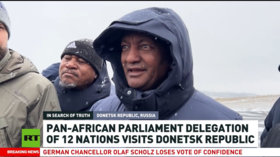Has Georgia disarmed the West’s secret weapon?

For several weeks now, protests organized by Georgian opposition forces have been raging in Tbilisi. They were sparked by the law “On the transparency of foreign influence”, which came into force this Monday after it was signed by the chairman of the Georgian Parliament Shalva Papuashvili.
French-born and raised President Salome Zurabishvili was supposed to approve the document, but refused to do so. The ruling party nevertheless had enough votes in parliament to override her veto. The opposition calls the legislation an analogue of Russia’s separate foreign agent law, although in fact, Georgia’s new reality has nothing to do with Moscow.
Law and protests
According to the new law, all non-profit organizations and mass media in Georgia that receive more than 20% of their annual income from abroad or which “pursue the interest of a foreign power” must be registered. This process involves filling out a declaration form and stating the organization’s income. Failure to register or submit the declaration could result in a fine of 25,000 lari (approximately $9,000). The Ministry of Justice of Georgia has also been granted the right to seek personal data and confidential information (excluding attorney-client privilege) to identify foreign agents.
Georgian legislators modeled the law on the US Foreign Agents Registration Act (FARA). However, the Georgian version of the law is a lot more liberal. It only stipulates that violators will be fined, but not imprisoned for up to five years, as is possible with FARA.
However, apparently this wasn’t good enough for the opposition. From April 15, when discussion of the bill was beginning in parliament, protests began in Tbilisi. The opposition, which had been vocal against what it claimed was a “pro-Russian” law, brought people out onto the streets. The demonstrators provoked the police, and this led to clashes between them and law enforcement. Police officers largely acted with restraint and refused to give in to provocations.
Back in late May, protest organizers, including opposition party leaders, said that rallies against the law would continue until the day of parliamentary elections in October 2024.
Street activism has indeed been an effective method of putting pressure on the country’s authorities in the past. The law was supposed to be adopted in early 2023. However, after several thousand people took to the streets of Tbilisi, then Prime Minister Irakli Garibashvili decided to withhold the legislation. A few months later, Garibashvili again attempted to adopt the law, but once again failed because of protests.
When Irakly Kobakhidze (the former chairman of the Georgian Dream party) became the country’s new Prime Minister, he pledged to do everything to finally adopt the law. Incidentally, despite the scandals, polls show that the ruling party still remains the most popular in the country. However, the Georgian opposition hardly cares about this.
Those who are against
Experts both in Georgia and abroad characterize these events as an almost exact replica of the tactics used for Kiev’s Euromaidan in 2013-2014. At that time, a small minority of the population gathered on the city’s main square to try to decide the fate of the entire country. In Georgia, most people do not oppose the new law, according to polls. Those who behave hysterically are the ones who are somehow affiliated with the NGOs which do not declare their income, sources of grants and external funding. The new rules will hit Western-affiliated pressure groups the hardest, so it is no surprise that pro-Western opposition forces have emerged as the law’s main opponents.
The leader of Georgia’s largest opposition party, United National Movement, MP Levan Khabeishvili, even left a hospital where he was being treated, and came to the parliament in a wheelchair in the hope of convincing the parliamentarians not to adopt the law, but failed to do so.
President Zourabichvili, who “reigns but does not rule”, also added fuel to the fire. She was born in France and came to Georgia at the personal invitation of former President Mikhail Saakashvili, who made her Minister of Foreign Affairs of Georgia. She later betrayed him by siding with the opposition. In 2019, through the efforts of the ruling Georgian Dream party, Zourabichvili became the country’s president. According to both legislation and political ethics, Zourabichvili ought to support her colleagues in the Georgian Dream party, but she has betrayed them as well.
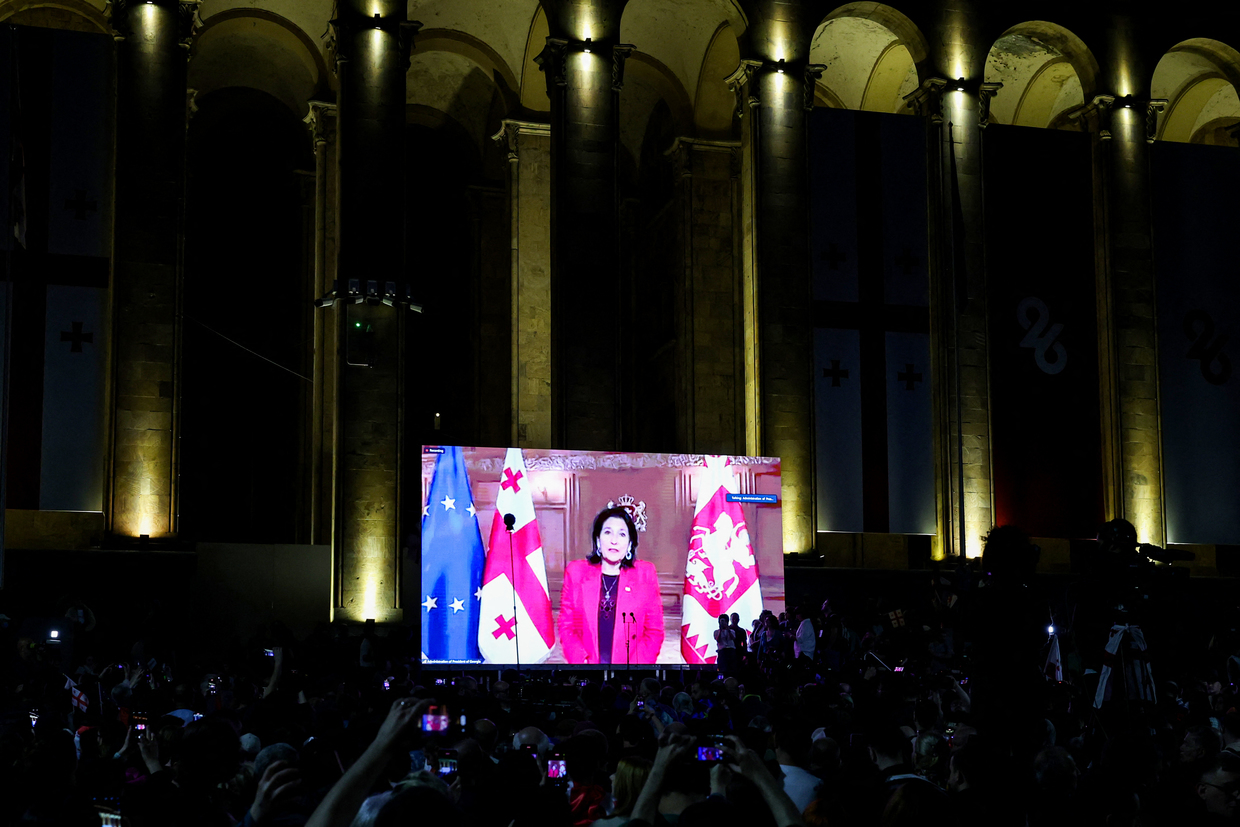
On May 18, she vetoed the adopted law, explaining that the initiative contradicts the country’s constitution and so-called European standards.
In fact, the parliament may soon impeach Zourabichvili – both the country’s legislation and the Georgian Dream party’s majority in the parliament make this possible. Zourabichvili has been unpopular with a large part of society for some time now. Her active support of LGBT movements and political duplicity all have had a negative impact on her image.
The West holds a grudge against the current Georgian leadership for its pragmatic policy in regard to Russia, and Georgia’s willingness to maintain dialogue with Moscow. Tbilisi has not imposed sanctions against Moscow and speaks in favor of expanding trade and economic ties with Russia. A visa-free regime, direct flights between the two countries, and visa-free travel between Georgia and Russia also contribute to the warming of relations between the two countries, which were once allies.
Georgia’s demonstration of sovereignty violates the rules established by the West and ruins its plan of a phased separation of Transcaucasia from Russia.
Responding to the adoption of the foreign funding law, US State Department representative Matthew Miller stated that the ruling party “Georgian Dream” has “taken the country away from the path to European integration, ignoring the aspirations of the Georgian people, who have been protesting for weeks,” noting that the move jeopardizes relations with Washington.
Brussels in turn has emphasized that the Georgian law contradicts fundamental EU principles and values and called on Tbilisi to “firmly return to the path” that leads to bloc membership. They also stated that they are “considering all options for responding to these events.”
The Kremlin called it absurd to consider the Georgian “foreign agent law” a “Russian project,” pointing out that the United States was the first country to come up with a “system to combat foreign agents.”
It is not a coincidence that a delegation of foreign ministers from the Baltic states and Iceland recently visited Tbilisi. The Estonian Foreign Minister openly threatened Georgia with severe consequences, while the EU announced that it intends to impose sanctions against Tbilisi.
This reaction was quite expected. The visiting foreign ministers joined the demonstrators on the streets of Tbilisi, demanding the law on foreign agents be repealed. In other words, the EU was directly interfering in Georgia’s internal affairs.
The West has hysterically and systematically accused Russia, China, and even Iran of interfering in its affairs, without providing any evidence. However, it did not hesitate to send its own ‘messengers’ to Georgia to stir up a civil confrontation that could escalate to something worse. US Secretary of State Antony Blinken has already announced that the US will impose visa restrictions on the Georgian authorities.
According to Blinken, the new law will allegedly “stifle the exercise of freedoms of association and expression, stigmatize organizations that serve the citizens of Georgia, and impede independent media organizations working to provide Georgians with access to high quality information”.
The West has grabbed hold of Georgia and tried to impose its own will upon the country.
Voice of Resistance
A few days ago, Kobakhidze made a major revelation – apparently, one of the European commissioners had openly threatened him with the fate of Slovak Prime Minister Robert Fico, who had miraculously survived an assassination attempt on May 15. The official in question turned out to be Olivér Várhelyi, European Commissioner for Neighbourhood and Enlargement. Várhelyi immediately started making excuses and said that his words had been taken out of context.
On the eve of Georgian Independence Day, the Secretary General of the Georgian Dream party and mayor of Tbilisi, Kakha Kaladze, openly stated that Washington was exerting pressure on the Georgian authorities and had threatened to impose sanctions for the adoption of the foreign agent law. “Georgia and the United States, as it turned out, are not partners, but enemies,” he said. Kaladze drew a parallel between the Georgian protests and the Euromaidan events in Ukraine in 2014, and said that “Ukrainization will not happen in Georgia”.
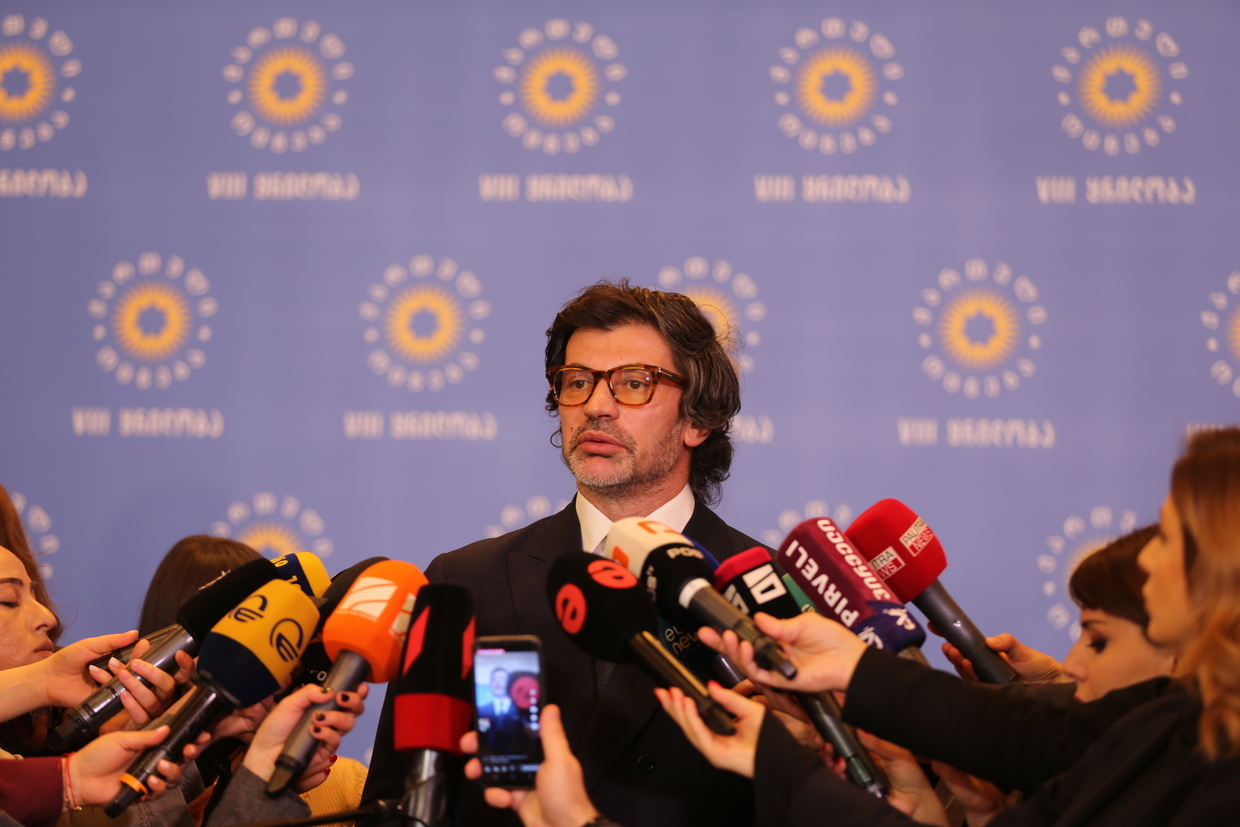
Many Georgian experts and analysts agree that the Georgian leadership will be able to overcome the challenge if it does not deviate from its course and manages to calm the people down without succumbing to both internal and external provocations. Georgian Dream has many supporters, otherwise the leadership of the party and the country would not have risked adopting the new law. Numerous left-wing parties, which advocate integration with the European Union, are not particularly popular.
The ruling party understands this well. If earlier the party followed a “pro-European” course, now it is slowly but surely moving away from it. External pressure and Western interference in Georgia’s internal processes, as well as the degradation of Western European elites, suggest that the Georgian leadership must act only based on its national interests instead of following a pan-European course as it had done for many years.
It is not a coincidence that Tbilisi now aims to develop pragmatic relations with Moscow and strengthen ties with China. This year, Beijing and Tbilisi signed an agreement on visa-free travel, and last year, then-Georgian Prime Minister Irakli Garibashvili (now the chairman of Georgian Dream) made a week-long visit to China, proclaiming a “new super partner in the international arena”. Washington and Brussels could not hide their dissatisfaction, and recalled the fact that the Georgian constitution stipulates “Euro-Atlantic integration”.
Anti-Western trend
Clearly, the law on foreign agents simply became an excuse for the opposition, allowing it to shake up the political situation in Georgia and earn additional political points ahead of parliamentary elections scheduled for the fall of 2024. The West is trying to take advantage of this, since it is dissatisfied with the policy of the current Georgian authorities, including the interaction between Tbilisi and Moscow, the active expansion of ties with Beijing, and Georgia’s growing orientation towards the Global South.
It is noteworthy that the Georgian foreign agent law has also inspired neighboring Türkiye. The Turkish parliament is now actively discussing the need to introduce an analogue of the Georgian law in order to ensure the transparent financing of a number of NGOs, which receive unknown amounts of money.
In Hungary, the law against foreign influence has also been quite effective. In 2017, the Hungarian parliament passed a law tightening control over NGOs that receive at least 7.2 million forints (18,000 euros) per year in foreign funding.
The government has directly stated that it intends to fight the influence of the Budapest-born billionaire George Soros, who, according to some reports, wanted to stage a “color revolution” in his homeland. According to the Hungarian law, all foreign-funded NGOs must be registered as “organizations receiving funding from abroad”, must display this label in media publications and at public events, and must provide an annual report on their activities. Organizations that do not comply are subject to closure.
The following year, Hungary’s ruling Fidesz party adopted a more extensive package of measures called “Stop Soros”, aimed at combating illegal migration and protecting traditional values. In 2020, the European Court of Justice ruled that the law on the transparency of NGOs contradicted EU legislation and should be repealed. However, the fight against Soros has not stopped.
In December 2023, a new law “On the Protection of National Sovereignty”, was adopted, and the Sovereign Protection Office was established in January. This state agency is designed to fight external attempts to influence Hungarian elections. The law stipulates imprisonment for up to three years for the foreign funding of election campaigns. Since Hungary is a member of the EU and NATO, Brussels does not approve of Hungary’s sovereign position, so it is exerting pressure on Budapest. But there’s not much else it can do.
Despite the fact that Georgia’s law is much more liberal, the West still believes that it can openly interfere in the sovereign affairs of a country that is not even a member of its institutions and alliances, and say which laws it should and shouldn’t adopt.
Obviously, the law’s entry into force will lead to a greater divide between Georgia and the West, and the next few weeks may be decisive for Tbilisi.

